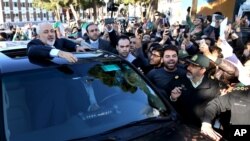Ecstatic crowds welcomed Iran's Foreign Minister Mohammad Javad Zarif back to Tehran on Friday after he led Iranian negotiators to an initial nuclear agreement that could profoundly improve Iran's standing in the world after years as a pariah state.
Iran and world powers reached a framework agreement on Thursday on curbing Iran's nuclear program for at least a decade, a step towards a final pact that could end 12 years of brinkmanship, threats and confrontation.
Zarif, 55, a fluent English speaker whose studies in the United States culminated with a doctorate in international politics at the University of Denver, was perfectly placed to lead Iran into the talks against the wishes of Iranian hardliners who saw them as a capitulation to Western pressure.
In many ways, it is a role the career diplomat has been preparing for his whole life. Among his Washington contacts are Vice President Joe Biden, former Secretary of Defense Chuck Hagel and both Republican and Democrat national security officials.
"Zarif's ability to bridge different worlds is very unique," Karim Sadjadpour, of the Carnegie Endowment for International peace, said before the deal.
"He's perhaps the only one in the world who meets regularly with both [U.S. Secretary of State] John Kerry and [Iran's Supreme Leader] Ayatollah Khamenei."
Zarif's earliest dealings with U.S. officials were rocky. As a junior diplomat in the early 1990s, he was involved in negotiations to free American hostages held by pro-Iranian militants in Lebanon, according to the memoirs of former U.N. envoy Giandomenico Picco.
Once the hostages were freed, the United States failed to deliver a goodwill gesture to Iran, leaving Zarif in a precarious position, according to Picco.
After the Sept. 11 attacks in 2001, and the U.S.-led invasion of Afghanistan, Zarif played a key role in the formation of the new Afghan government, convincing quarrelling parties from Iran's poorer neighbor to negotiate.
"Zarif had achieved the final breakthrough without which the [Hamid] Karzai government might never have been formed," said James Dobbins, the main U.S. diplomat at the Bonn conference that prepared the ground for Afghanistan's future.
'Grand bargain'
Under reforming President Mohammad Khatami, Zarif was appointed permanent representative to the United Nations in New York in 2002 and was involved in secret talks to strike a "grand bargain" to normalize relations with Washington, according to Western diplomats.
The talks foundered in 2003 after then-president George W. Bush labelled Iran a member of the "Axis of Evil," the diplomats said.
"He was always trying to do what was possible to improve relations in a very intelligent, open and clear way," said a senior Western diplomat who had repeated dealings with Zarif.
"This is someone who knows the United States very well and with all the frustrations of the past is still someone they know in Washington," he said.
After hardliner Mahmoud Ahmadinejad replaced Khatami as president in 2005, Zarif's political fortunes began to decline.
But when Hassan Rouhani was elected president in 2013, vowing to end the freeze in relations with the West, the softly spoken, well-connected and highly articulate Zarif was his obvious choice to re-open talks.
That decision bore fruit this week, as Zarif built sufficient trust with world powers to forge a preliminary deal, while maintaining the necessary support from Khamenei, whom he thanked for his support as he arrived back in Tehran.
His skills will continue to be called on over the next three months, as Iran and the P5+1 group wrangle over the details of a final deal that commentators warn could still fall through.










